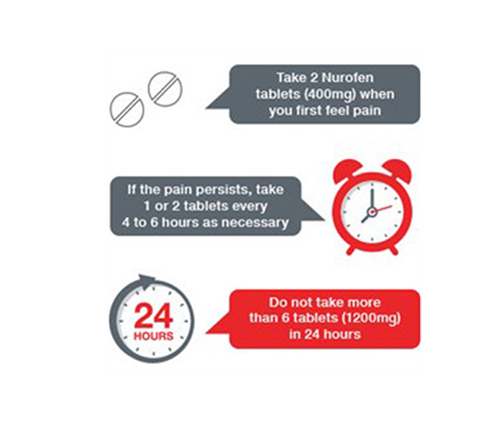To calculate the correct Nurofen dose for your child, use the Nurofen for Children dosage calculator.
Most Nurofen products contain ibuprofen, an anti-inflammatory pain reliever (NSAID) that effectively relieves mild to moderate pain associated with conditions such as tension headaches, migraines, back pain and period pain.
Nurofen (ibuprofen) dosage for adults and children from 12 years

Take 2 tablets (400mg), then 1 or 2 tablets every 4 to 6 hours as necessary. Do not take more than 6 tablets (1200mg) in 24 hours.
When to check with your doctor or pharmacist
Nurofen is designed for the temporary relief of mild to moderate pain. Seek further advice if your pain persists for more than 3 days.
There are some occasions where Nurofen might not be suitable for you. Ask your doctor or pharmacist first if:
- You are taking other medicines containing ibuprofen, aspirin or other anti-inflammatory medicines (NSAIDs) – taking ibuprofen on top of these medicines may be harmful.
- You are taking medication regularly – some medicines may affect how ibuprofen works.
- You suffer from asthma – about 1 in 10 asthmatics are sensitive to ibuprofen.
- You are over 65 years old.
- If in doubt, always consult your healthcare professional
When should I not take Nurofen?
- If the blister foil is broken when you open the pack.
- If you have a stomach ulcer or other stomach disorders, kidney or heart problems.
- Does ibuprofen cause stomach problems?
- If you are allergic to ibuprofen, aspirin or other anti-inflammatory medicines. If you have an allergic reaction, stop taking Nurofen and see your doctor immediately.
- During the first 6 months of pregnancy, except on your doctor’s advice. Do not use at all during the last 3 months of pregnancy.
- Can I take ibuprofen when pregnant?
- For more than 3 days at a time, except with your doctor’s advice
References
- 1
Nurofen Tablets (ibuprofen 200mg). Product Label.
- 2
Rainsford KD, Bjarnason I. J Pharm Pharmacol 2012; 64: 465–9.
- 3
Moore N et al. Clin Drug Invest 1999; 18(2): 89–98, funded by Boots Healthcare International (now owned by Reckitt Benckiser Plc).
- 4
Tanner T et al. BMC Clin Pharmacol 2010; 10: 10.